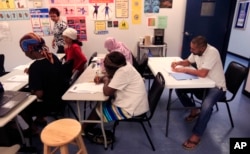A federal judge on Thursday rejected efforts by Texas to stop the resettlement of Syrian refugees within its borders.
The ruling comes days after presumptive Republican presidential nominee Donald Trump called to block non-citizen Muslims from entering the U.S. following the Orlando nightclub massacre.
Even before the attack, Americans were divided, mostly along party lines, on the issue of refugees from war-torn countries in the Middle East.
A survey conducted in late May by the Brookings Institution found of those polled, just 38 percent of Republicans supported taking in refugees from Syria and the Middle East, compared with 77 percent of Democrats. But among Trump supporters, an overwhelming 77 percent said they oppose taking in refugees.
So who are these people who cause such a divide among Americans, triggering feelings of dread and suspicion in some and feelings of empathy and hospitality in others?
Millions have been forced to flee the bloody conflicts in Syria, Iraq, Libya and other Middle Eastern nations.
In 1951 the United Nation's Refugee Convention defined a refugee as someone who "owing to a well-founded fear of being persecuted for reasons of race, religion, nationality, membership of a particular social group or political opinion, is outside the country of his nationality, and is unable to, or owing to such fear, is unwilling to avail himself of the protection of that country."
By the end of 2014, there were 19.5 million refugees worldwide, according to the United Nations, 14.4 million of whom were under the mandate of the United Nations Human Rights Council. This was an increase of 2.9 million from 2013.
The remaining 5.1 million refugees were registered with the United Nations Relief and Works Agency.
However, there are an estimated 59.5 million forcibly displaced persons around the world, according to United Nation's Global Trends report. This population not only includes refugees, but internally displaced persons, asylum-seekers and stateless people as well.
Resettling in US
President Barack Obama has set a goal of resettling 10,000 Syrian refugees in the 2016 fiscal year, which began on October 1. But the administration is still far behind that schedule.
About 3,500 Syrian refugees have been admitted, leaving about 6,500 spots open with less than four months to go.
In order to obtain refugee status, people have to go through extensive processes, including fleeing from the country in conflict, registering as a refugee with the United Nations, waiting — sometimes for years — to be approved, and undergoing the resettlement process into the country they will be in next.
Refugees coming in through the U.S. Refugee Resettlement Program must pass through a multilayered security screening process that includes an in-depth, in-person interview by well-trained Homeland Security officers, and multiple highly rigorous background checks, including biographic and biometric investigations, using multiple databases.Prior to the attacks on September 11, 2001, the process took about one year; now it is a two- to three-year process.
Human face
In the Midwestern U.S. city of Kansas City, Missouri, Ahmad Alabood is trying to make a life while the refugee debate rages on the U.S. political stage.
Alabood, a 45-year-old construction worker from Homs, Syria, along with his wife and five children, is among the first Syrians to to be resettled in the U.S. under the Obama administration's surge program.
Since the family arrived in April from a refugee camp in Jordan, Alabood has been dealing with his children's health issues, including a baby with elevated lead levels in his blood and a 5-year-old with a heart ailment, learning English, having all his teeth removed because they had gone bad, and talking to doctors about shrapnel in his head and legs from a bomb blast in Homs a few years ago.
Alabood has not yet started a job. The first priorities have been tackling the family's health issues and learning English. But the center that has been overseeing the family's resettlement said Alabood is expected to start a job in the fall.






